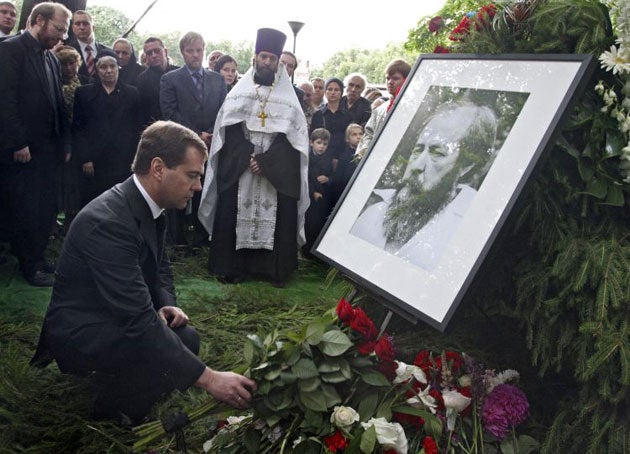Solzhenitsyn, Russia's last conscience, is laid to rest

Your support helps us to tell the story
From reproductive rights to climate change to Big Tech, The Independent is on the ground when the story is developing. Whether it's investigating the financials of Elon Musk's pro-Trump PAC or producing our latest documentary, 'The A Word', which shines a light on the American women fighting for reproductive rights, we know how important it is to parse out the facts from the messaging.
At such a critical moment in US history, we need reporters on the ground. Your donation allows us to keep sending journalists to speak to both sides of the story.
The Independent is trusted by Americans across the entire political spectrum. And unlike many other quality news outlets, we choose not to lock Americans out of our reporting and analysis with paywalls. We believe quality journalism should be available to everyone, paid for by those who can afford it.
Your support makes all the difference.The air was thick with the scent of incense and freshly cut flowers, as more than a dozen white-robed Orthodox priests sang hymns and recited prayers in a three-hour service at the funeral of Alexander Solzhenitsyn in Moscow.
Broadcast live on state television, the funeral was the epilogue to an extraordinary life that saw war, imprisonment and exile. He was buried in the grounds of Moscow's Donskoi monastery, as a military salute sounded and soldiers marched in formation.
"There goes Russia's last conscience," sighed one elderly man, as the coffin was lowered into the ground. President Dmitry Medvedev looked on, flanked by Solzhenitsyn's widow, Natalya, and his three sons, and appeared to shed a tear as the pallbearers covered the coffin with earth.
When the service began, there was a mere handful of mourners present, but by the end, the small church was packed with hundreds of Russians. A steady stream of people also passed through during the course of the morning, many leaving roses and carnations.
Russians across the political spectrum were there to pay their respects. As well as Mr Medvedev, there was Yury Luzhkov, during whose reign as Mayor of Moscow the city has transformed into a centre of capitalist excess – all the trappings of modern society that Solzhenitsyn railed against in his later years and despised almost as much as Communism. Also present in the church was the writer Eduard Limonov, the leader of the banned National Bolshevik Party. On a normal day, presidential security would not have let him within a mile of Mr Medvedev. He filed past the coffin and the Russian President calmly and without incident.
Most Russians of Solzhenitsyn's stature are buried in the prestigious Novodevichy monastery, where former president Boris Yeltsin and the cellist and conductor Mstislav Rostropovich were laid to rest last year. But the writer himself had asked five years ago to be buried at Donskoi, and it seemed a fitting last resting place. The Second World War tanks, heavy artillery and Russian flags on display at the entrance might seem out of place in a monastery, but would have appealed to the writer, an ardent Russian nationalist and Orthodox believer, who, even in his American exile, had criticised the West.
Solzhenitsyn, whose writings about the Gulag opened the eyes of people both inside and outside the Soviet Union to the horrors of the Soviet labour camp system, died on Sunday, aged 89. Mr Medvedev has issued a decree establishing a scholarship in Solzhenitsyn's honour and ordering the Moscow government to rename a street after him.
Join our commenting forum
Join thought-provoking conversations, follow other Independent readers and see their replies
Comments